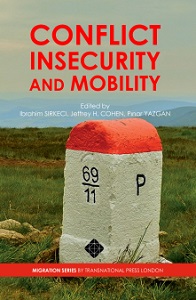As if all life had vanished... The return of Kurdish villagers to their hometowns
As if all life had vanished... The return of Kurdish villagers to their hometowns
Author(s): Şemsa Özar
Subject(s): Geography, Regional studies, Transformation Period (1990 - 2010), Present Times (2010 - today), Migration Studies, Politics and Identity, Peace and Conflict Studies
Published by: Transnational Press London
Keywords: Kurds; Kurdish villages; migrations; 90s; armed conflict; Turkish security forces; Istanbul; Kavar;
Summary/Abstract: In the early 1990s, more than a million Kurdish villagers had been forced to flee their villages in the course of the armed conflict between the Turkish security forces and the PKK (Partiya Karkerên Kurdistan – the Kurdistan Workers’ Party). The inhabitants of thousands of villages and hamlets in the Kurdish region of Turkey had been evicted by the Turkish security forces primarily to deprive the PKK guerrillas of their rural environment and support from the villagers. In the literature it is known as four cuts. It means cutting off the sources of food, funds, intelligence and recruits to the rebel armies. Numerous studies and personal accounts that take up the issue of forced migration of Kurds from a variety of perspectives have been published (TMMOB, 1998; Kurban et al., 2006; Kışanak, nd.; Dinç, 2004; Kalkınma Merkezi, 2010; Demirler & Eşsiz, 2008; Çağlayan, Özar, & Doğan, 2011; Yağız et al., 2012), but to date very little has been written about people returning to their villages (Jongerden, 2008; Göç-Der, 2013). This article aims to elucidate the return of Kurds to their homeland, to those villages they once had been brutally driven out of. On the other hand, it is a known fact that the majority of Kurds have not yet returned to their villages. Kavar people, however, after living in Istanbul for almost a decade, in a metropolis that they had no initial intention to settle, decided to go back to their homeland. I will, thus, often use quotations from face-to-face interviews conducted with the returnees in the villages of Kavar, a region in the southwest of Lake Van, Behra Wanê (Van Sea) as Kurds name it. I attempt, in this article, to disclose the ways in which the Kavar people through all these years of struggle constructed their subjectivities expanding on political and ethical imaginaries.
Book: Conflict, Insecurity and Mobility
- Page Range: 101-113
- Page Count: 13
- Publication Year: 2016
- Language: English
- Content File-PDF

